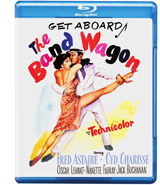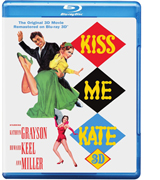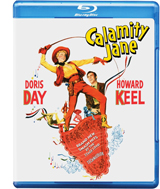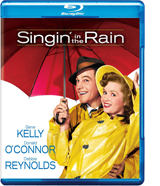Reviewed by Glenn Erickson
It isn't uncommon for a home video company to release a new Blu-ray restoration first as one title in a large, expensive set, and hold off an individual release for half a year or more. A Steven Spielberg Collection last fall forced fans to buy Jaws and Jurassic Park again, if they wanted the new Blu-rays of the other titles in the boxed set. Once again showing their collector-friendly attitude, Warner Home Video is giving us four of the label's biggest vintage musical titles in both a Musicals: 4-Movie Collection box and also as individual purchases.
The big draw this time around is the hotly awaited Kiss Me Kate in 3-D, but The Band Wagon and Calamity Jane are also newly refurbished. The title that many musical fans will already own is Singin' in the Rain. That might seem a bum deal until one sees the price discounts at Amazon, which are a bargain in anybody's book.
I've already given the remarkable new Kiss Me Kate disc its own (glowing) review. I haven't seen the other two new-to-Blu titles in years, but a quick check of the old DVDs shows that they're both major improvements.

The Band Wagon has become for many the favorite of all MGM musicals, if only because we've seen Singin' in the Rain too many times - screenings of that classic on TCM ought really to be meted out less frequently. Stanley Donen & Gene Kelly were forever batting for the fence, and MGM's dance ballets, fantastic as they were, sometimes drifted into artsy territory. The more retro The Band Wagon satirizes Broadway pomposity but also nurtures a wistful, somewhat melancholy streak. Instead of championing young super-talents it gives a thoughtful look to the comeback of an old-time hoofer convinced that he belongs in a museum, not on a stage. The story is show-biz corn from one end to the other, but the sentiments are truly profound.
In a nutshell, over-the-hill Hollywood star Tony Hunter (Fred Astaire) returns to Broadway in the hopes of revitalizing the stage career he left two decades before. Enthusiastic writers Lester and Lily Marton (Oscar Levant and Nanette Fabray) hook Tony up with the egotistical man of the theater Jeffrey Cordova (Jack Buchanan), who wants to do a high-toned musical version of Faust, pairing Tony as a modern tough guy tempted by a siren played by a snooty ballet dancer, Gabrielle Girard (Cyd Charisse).
The Band Wagon is pure enjoyment from one end to the other. I've never understood complaints about the lack of a great performance from Cyd Charisse. She's an even more magical dance partner for Astaire than she was with Gene Kelly. The film plays at a level of pleasant artificiality that completely excuses the odd romantic story. Tony Hunter loves Gabrielle because that's what happens in musicals -- the real sex plays out in the dance numbers.
Astaire graciously plays to the fact that sooner or later even the greatest stars have to bow out. Astaire was a 'quit while you're ahead' type of performer who needed intermittent encouragement to believe that his kind of entertainment was still necessary, and the accolades for The Band Wagon must have been quite a boost. Tony Hunter feels insecure about his height and is unsure of his old-fashioned style. But he jumps into Jeffrey Cordova's half-baked classical mish-mosh in a spirit of full cooperation. Proof of Astaire's classy attitude is that he generously shares the spotlight with Jack Buchanan, a great performer really past his prime, and fairly obscure to general American audiences. Betty Comden and Adolph Green write themselves in as a bickering married couple, impersonated by pixie-ish Nanette Fabray and the cantankerous Oscar Levant. Levant must have been awfully talented to be tolerated in show business.
The parody of putting on a pretentious play is a new twist on the backstage musicals of the thirties. Instead of hoofer chorus girls elbowing each other for jobs and the ingenue songwriter being cheated by his backers, we have a huge production being driven off a cliff by a funny megalomaniac who has lost sight of reality. It's a great opportunity to lampoon overproduced stage pyrotechnics, feuding talent and feeble writing. They even get in some fun jibes at Marlon Brando's method acting with Tony's terrific "You can't spread ethics on a cracker" speech.
The floppo opening night of Jeffrey Cordova's hilariously incompetent Faust musical might have been scripted by Tex Avery. Just when we think we're going to see the show, a wailing chorus ushers in visions of utter failure and desolation -- a tumbleweed in the desert, the Isle of the Dead and the Egg that Jeffrey Codova's show has laid. It's priceless. The investors and other first-nighters leave the theater like zombies at their own funeral.
Most of Arthur Schwartz and Howard Dietz's songs were at least twenty years old. The new tune That's Entertainment equals the similar Irving Berlin hit from Annie Get Your Gun, There's No Business Like Show Business. The central romantic set piece is Dancing in the Dark. There's little need to describe its grace and beauty except to contrast Astaire's effortless smoothness with Gene Kelly's athletic dynamism. Astaire dances as if he's nothing human, exempt from mortal concerns like gravity and fatigue.
The Band Wagon doesn't pretend that it has any dramatic goals or higher themes. Everyone including Cordova throws their lot in with Tony to rework Faust into an old-fashioned string of variety acts. We see the stars in four or five killer numbers in a row. They're all perfect beyond words. Nanette Fabray's writer Lily Marton transforms into a socko performer for Louisiana Hayride and Triplets. Although the numbers are simple in conception the execution and performance level are far above even the MGM average. Astaire and Buchanan's nostalgic soft-shoe for I Guess I'll Have To Change My Plan is sublime. This is the A-Team, without a doubt.
Astaire's first big numberPut a Shine on Your Shoes would lift anybody's spirits. The capper is the Girl Hunt Ballet, where Cordova's fizzle is distilled into a deadly accurate Mickey Spillane spoof better than the originals. Astaire's Rod Riley slings tough talk like "I hit hard - And I hate hard" while making fun of hardboiled private detective conventions. The ballet takes up the challenge of Gene Kelly's elaborate dance epics, creating one just as artful and twice as funny. Anybody taking film noir too seriously should consider this as mandatory viewing. The parody is so good I can imagine Bill Gaines seeing The Band Wagon in 1953 and deciding that his brand-new Mad Magazine venture is going to work after all.
Besides Ava Gardner, keep a quick look-out for Julie Newmar in the Girl Hunt salon -- she
goes by in a flash. Barbara Ruick is also visible in one of the train scenes.
The Band Wagon is a vast improvement on the old DVD, which had frequent color and alignment issues. This scan and encoding perfectly reproduces the film's delicate hues and often jarring designs. Bright colors no longer bloom, as when a fantasy fashion parlor hits us with a full screen of purple velvet. And Cyd Charisse's reveal of her red dress in The Girl Hunt is more eye-popping than ever. That shot singlehandedly captures Vincente Minnelli's visual style. A couple of the dialogue scenes perhaps seemed bit bright and warm, as if there were slight problems with the source material. All of the musical numbers are flawless.
The extras duplicate most of what was presented on the old DVD. I've listed them in the stats outline at the bottom of the review.

I just reviewed Kiss Me Kate a couple of days ago; the disc and its extras in the boxed set are identical. Here's the link to that review.
I will say here that I've seen parts of the disc in 3-D three times now. Probably because of the exciting subject matter -- all that great Ann Miller tap dancing, and Bob Fosse, Bobby Van and Carol Haney's big jazz dance number -- Kiss Me Kate is the most 'dimensionally pleasing' 1950s 3-D Blu-ray I've yet enjoyed.
 Calamity Jane would be just a poor man's Annie Get Your Gun were it not for the spirited performances of Doris Day, Howard Keel and the now obscure but very talented Allyn McLerie. Warners had shoehorned Ms. Day into a series of so-so musicals where she had to keep actors like Jack Carson from elbowing her out of the spotlight. As the westerner Calamity Jane, Day gets a chance to let her (ample) tomboy spirit shout, sing and kick up a fuss.
Calamity Jane would be just a poor man's Annie Get Your Gun were it not for the spirited performances of Doris Day, Howard Keel and the now obscure but very talented Allyn McLerie. Warners had shoehorned Ms. Day into a series of so-so musicals where she had to keep actors like Jack Carson from elbowing her out of the spotlight. As the westerner Calamity Jane, Day gets a chance to let her (ample) tomboy spirit shout, sing and kick up a fuss.
The rough-hewn Calamity Jane (Doris Day) promises to bring famous actress Adelaid Adams (Gale Robbins) to the glamour-starved miners of Deadwood, but reappears with a phony, Adelaid's maid Katie Brown (Allyn McLerie). Both Wild Bill Hickock (Howard Keel) and local cavalry officer Lt. Danny Gilmartin (Philip Carey) take an immediate shine to Katie. Jane is at first confused, but with Katie's help gets herself in a more feminine shape to woo a gentleman of her own. But Jane just doesn't know how to control her stronger emotions.
Calamity Jane is from Warner Brothers, who generally came in second to MGM in the musical genre. But they had Doris Day, a talent powerhouse who made stale material fresh and fresh material shine. The show is dated in many ways, but nothing about Day begs for an apology.
Betty Hutton's grating Hick in Annie Get Your Gun took some getting used to. Doris is theatrically so right as the athletic, volatile Calamity that we like her immediately. She tells tall tales, makes threats idle and real to the cowboys at the bar and in general is an all-around loose cannon. She has delusions that the Army Lieutenant (a typically sincere-wooden Philip Carey) loves her. She treats the man who could really appreciate her, the duded-up Wild Bill, as an equal. Although she claims she wants a house and kids, Jane really doesn't think anything through. She's likely to rush off to perform some suicidal rescue at a moment's notice.
Doris Day dominates, while Howard Keel stays even more in the background than he did in Annie. There are several songs and a fairly okay one called Windy City, but the standout is the Top-40 pop ballad Secret Love, one of Day's best songs ever. It stops the show... and also shows off Warners' new and improved 1953 audio engineering.
A lot has aired about repression and liberation in the sexual politics of Calamity Jane. Calamity is more masculine than the men and has to be taught from scratch the basics of socially sanctioned gender roles. In 1953 femininity was one part allure, to three parts comportment, to six parts housecleaning, to twenty parts cooking. Over the course of a song Jane's wretched shack is transformed into a sparkling 'homey' cottage complete with flowers on the windowsill and their names on the door. But even when dolled up in fancy dress and hairstyle Jane never stops being Jane -- she still walks like a man and displays her emotions like an angry woodchuck. Gay activists reportedly like the idea that Jane remains essentially herself. A dress and some makeup don't suddenly transform her into a Gibson Girl.
Maybe it's all a carefully rehearsed stage illusion, but ex-big-band singer Doris Day had one of the freshest personalities in 1950s show business. Her smile just brightens one's heart. In a newsreel extra her beaming reaction to being presented with an award is about as sincere as sincere can get. Even more telling is Day's willingness to play in a movie where the supporting actresses (particularly the cute Allyn McLerie) are more conventionally attractive. You'd think there must have been a special talent agency In the old Hollywood where producers could hire showgirls guaranteed to be more homely than the star, no matter how old or broken-down she was. Day had enough self-possession not to insist that every other woman in her films be a bow-wow. For that, she's truly a class act.
Here's where a warning flag is dropped: when it comes to Native Americans Calamity Jane is no better and maybe worse than Annie Get Your Gun. The 'varmint redskins' are basically there to be made fun of or shot dead. Even for '53 the treatment is politically retro. I've done my duty.
The new Blu-ray of Calamity Jane is a major improvement over the old DVD. Colors are warm and some grain becomes apparent but the consistently bright image is free of the registration problems sourced from old composite negatives. The old disc occasionally looked like a misprinted newspaper photo. And the audio is much stronger as well.

Singin' in the Rain is the same encoding from Warners' Blu-ray special edition. It is of course the flagship film of MGM's postwar musical powerhouse. The studio had already upped their game with the input of Gene Kelly and Stanley Donen and others, in On the Town and the lavish An American in Paris, which in terms of dancing clearly sought to out-do the English hit The Red Shoes. Kelly was again allowed to cut loose with a lengthy ballet, and this time produced one integral to the wonderful, sweetly satirical Hollywood story invented by Comden and Green to recycle old songs in the MGM music library. TheCitizen Kane of musicals, Singin' in the Rain rushes pell-mell through a fairly accurate telling of the coming of sound to Hollywood.
Of all the mainstream Classics We Must See, this show is perhaps the easiest to watch again and again. It's nice to know that even in the far future, kids tiring of artificial entertainments will discover the music, color, talent and magic of a dazzling wonder movie made when Ike and Dick were waltzing into the White House. In Singin' in the Rain we almost believe that Gene Kelly and Donald O'Connor can fly.
The script has fun with everything Hollywood: pompous premieres, obnoxiously phony stars, nervy aspirants to greatness, and the kind of innovations that made musicals the first success story of the talking screen. Is a story rundown even necessary? Hambone Don Lockwood (Gene Kelly) pursues an elusive Hollywood hopeful, Kathy Selden (Debbie Reynolds), while being harassed by his gorgeous but bubble-headed leading lady, Lina Lamont (Jean Hagen). When the new talking pictures put careers in jeopardy, Don's lifelong pal Cosmo Brown (Donald O'Connor) saves the day by reinventing Don and Lina's latest silent flop as an all talking, all singing, all dancing marvel.
A couple of years ago, a French movie called The Artist filtered Singin' in the Rain through silent comedian Max Linder, coming up with an amusing but forgettable show that seemingly won the Best Picture Oscar because it featured a cute dog. There's no real comparison. Singin's merciless, yet affectionate parody captures the glamour of silent movie legends: "Dora! Not in front of all these Peee-pulll!" With his good heart and Dazzledent grin Kelly is perfect as the phony star, while the marvelous Jean Hagen's incredibly professional -- and selfless -- performance creates one of the most original characters ever. Newcomer Debbie Reynolds gets her big break while Donald O'Connor's dancing and charm keeps pace with Kelly at all times.
Adding interest is Singin' in the Rain's surprisingly accurate picture of Hollywood's transition to sound. The technical problem of hiding microphones on the set, with picky soundmen commanding all from an isolated booth, was almost as absurd as shown in the film. Donald O'Connor's Cosmo Brown is the greatest technical innovator in Hollywood history. Starting as a lowly hoofer and piano accompanist for romantic love scenes, he rescues an un-releasable picture by turning it into a flashback surrounded by new musical material. He single-handedly introduces the idea of using playback to dub new lines into existing silent dialogue scenes. He invents overdubbing, to replace the voice of an actress who can't sing. If the truth be told, Donald O'Connor's personality redeems what's not always likeable in Gene Kelly. If a great guy like Cosmo can stand Don, the big stiff has to be o.k..
On the other hand, after 40 viewings, Debbie Reynolds' Kathy Selden now seems less a sparkling young hopeful and more of a calculating opportunist. Sure, she's fresh and talented, but watch her face when she realizes that her hitchhiker is a famous movie star. Her tune changes immediately, and she scrambles to affect the correct hard-to-get act that will click with a vain womanizer like Lockwood. Yes, yes, ambition is not a crime, and throwing pies and confessing all later is not the work of a climber. But you can't help thinking that Lina Lamont is correct when she protests that Kathy is using Don. It would be fun to see a variation on Singin' in the Rain that's more like All About Eve. Add a scene where Kathy sleeps with Lockwood (sorry to spoil the beauty of the film) and the picture would be a scathing critique of the Selden character.
Gene Kelly's self-contained musical ballet barrage "Broadway Melody" is a rags-to-riches digest summation of New York musicals to date. Kelly's co-stars do not get an invitation to the dance -- it's Don Lockwood's show all the way. His dance partner is Cyd Charisse, who raised eyebrows with her role as a dancing nightclub temptress. Although a fixture around the margins of MGM musicals for at least seven years, this must have been the performance that made Charisse a star. She brings a completely unexpected sex factor to the show, with her Louise Brooks helmet haircut providing the only link to the film's period setting. But that's no Denishawn dance she's doing. When it's all over, we return to the screening room, where Don's enthusiastic but indecisive boss says, "Gee, I'll have to see it on film first." Perhaps Singin' in the Rain's biggest accomplishment is to close the gap between what filmmakers imagine their movies to be, and how they turn out. This show may be perfect on its own terms. If it isn't, what would you do to improve it?
Singin' in the Rain looks incredibly good; along with The Wizard of Oz and Gone With the Wind, it's been given a full 3-strip digital restoration, right down to the original Technicolor roots. If you already have the 60th Anniversary edition, you need to look no further. I've listed the extras just below.
On a scale of Excellent, Good, Fair, and Poor,
Musicals: 4-Movie Collection Blu-ray
rates:
Movies: Excellent
Video: Excellent
Sound: Excellent
Audio: English plus French and Spanish on all titles, minimum
Supplements: Band Wagon: Commentary with Liza Minnelli and Michael Feinstein; featurette Get Aboard!; docu The Men Who Made the Movies: Vincente Minnelli; vintage short Jack Buchanan with the Glee Quartet; cartoon The Three Little Pups; Trailer. Kate: Featurette Cole Porter in Hollywood: Too Darn Hot with Ann Miller, Howard Keel, Kathryn Grayson, Tommy Rall and James Whitmore; Mighty Manhattan, New York's Wonder City Cartoon Barney's Hungry Cousin; Trailer. Jane: Joe McDoakes Short So You Love Your Dog; cartoon Duck Dodgers in the 24th and a half Century; newsreel clip Western Style Premiere and Photoplay Magazine's Film Awards; Trailer. Singin': Composite commentary with many stars and contributors; docu Raining on a New Generation; Trailer.
Deaf and Hearing Impaired Friendly?
YES; Subtitles: English, French, Spanish sometimes Portuguese, and a few others; Singin' in the Rain has 14 different subtitle selections.
Packaging: Four discs in heavy card box in fanfold disc holder, with envelope with mini-collector stills.
Reviewed: March 8, 2015

Text © Copyright 2015 Glenn Erickson
See more exclusive reviews on the Savant Main Page.
Reviews on the Savant main site have additional credits information and are often updated and annotated with reader input and graphics.
T'was Ever Thus.
Return to Top of Page
|


